Ben Ezechime, Enugu
The Enugu State Government and some Stakeholders on infectious diseases, have pledged to work together to reduce incidence of infectious diseases in the state.
The pledge was made during a one-day workshop organised by the New-Life Community Care Initiative (NELCCI) Nigeria to “Develop Engagement Plan” on fight against AIDS, Tuberculosis (TB) and Malaria (ATM), in Enugu.
The programme is being financed by Global Fund (GF), implemented by the Civil Society in Malaria Control, Immunisation and Nutrition (ACOMIN) National in collaboration with NELCCI, Enugu State.
Speaking at the event, the State Malaria Programme Manager and Coordinator, Dr Ifeoma Otiji, said the advocacy on ATM was important for communities to know what was on ground.
She described malaria as an endemic disease that should not be toyed with because of its impact, prevalence and burden in the society.
She noted that the burden was low in Enugu while its prevalence was 10.5 per cent when the international donors were supporting the state but regretted that their exit many years ago made the state to relax on the fight.
“The malaria prevalence now stood at 24 per cent higher than national that stood at 22 per cent. But we are now getting back to malaria interventions as the the state has received malaria drugs from our partners.
“There will be free test and malaria drugs available for Enugu people especially those at the community level where we will be partnering with ACOMIN during the implementation,” she said.
Dr Chidiebere Odoh, TB State Programme Manager, Enugu, while pledging that the department would partner NELCCI and other CSOs in sensitising members of the public on dangers of TB, said the sensitisation on TB had been ongoing given enormous supports from sponsors and NGOs.
Odoh, represented by Mrs Nwanneka Agbo, the Advocacy Communication and Social Mobilization, Tuberculosis, Enugu State explained that TB was infectious disease caused by mico bacterium and spread through spitting, coughing, amongst others.
She advised NELCCI to develop a strategy for sensitising communities to avoid fear of being stigmatised.
“People are now aware of the virus but when you go for sensitisation in communities, and you asked people to test for TB they will disappear because of the stigma attached to it.
“You can win them by telling them to conduct a test if they are having cough that lasted for more than 3 weeks without mentioning TB,” she advised.
In an address, the Executive Director of NELCCI Florence Ifeanyi-Aneke, said GF admitted that activities to fight AIDS, Tuberculosis and Malaria ATM cannot be successful without significant participation of Civil Society Organisations and the main affected key population groups.
She disclosed that the programme aimed at fighting ATM often had a limited impact as enough attention was not paid to obstacles connected to human rights, gender inequality and social exclusion.
“To eliminate these obstacles affecting these three diseases, GF approved continuation of grants, for community engagement and strategic initiatives,” she said.
Ifeanyi-Aneke, who is also, the State Coordinator of ACOMIN, added that the programme was being implemented in Nigeria, Cameroon, Ghana Ivory Coast and Niger Republic.
“In Nigeria, it is being implemented in 10 states across the six geo political zones of the country. The states are Adamawa, Anambra, Delta, Enugu, Imo, Kebbi , Kwara, Niger, Ogun, Ondo and Oyo,” she said.
The coordinator further said the programme was implemented in Mkpologwu Community in Enugu East Council Area, adding that ACOMIN national engaged 10 Non-Governmental Organisations across the country for effective implementation of the project at community level.
“It is all about advocacy, community engagement and participation in state partners activities as well as development of engagement plan for collaboration, information sharing amongst stakeholders,” she explained.
The workshop was attended by the representatives of the Network of People Living with HIV and AIDS in Nigeria (NEPWHAN), the Media, Community and Religious leaders and other key members of the population.

